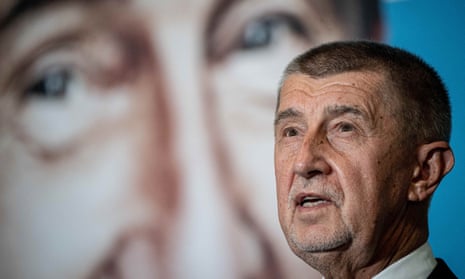The populist Czech president remained in hospital on Monday as news sank in that Andrej Babiš, the billionaire prime minister, had suffered a shattering general election defeat days after the release of the Pandora papers and that Miloš Zeman, his main political champion, may be too ill to save him.
Zeman, 77 – whose constitutional powers invest him with a kingmaker’s role potentially allowing him to keep Babiš in office – remained in Prague’s central military hospital a day after being rushed there for emergency treatment for an unspecified chronic illness. Doctors said on Monday that they had stabilised his condition, although doubts persist about his future ability to carry out his duties.
Away from Zeman’s bedside, analysts pondered the reasons for Babiš’s unexpected defeat, which came just days after the release of the Pandora papers shone a light on his financial affairs. The result confounded pollsters’ surveys showing his populist ANO (Action for Dissatisfied Citizens) party with a lead of up to 5%. In the event, it lost the popular vote by less than 1% to the centre-right Spolu (Together) faction, which had painted the prime minister as a threat to democracy.
Speculation that the Pandora papers – and their disclosure that Babiš had set up a network of offshore companies to buy a mansion and other properties in the south of France for £13m in 2009 – may have played a decisive role was fuelled by a Czech Television poll suggesting 8% of ANO supporters switched to another party as a result. Babiš has denied any wrongdoing.
The revelations, published four days before the poll, dominated the Czech news for days afterwards, undercutting Babiš’s normally effortless ability to dictate the media agenda through his ownership of two of the country’s leading newspapers and its biggest commercial radio station. Even papers in the Mafra group, the publishing house that is part of Babiš’s multi-sector Agrofert conglomerate, found they could not ignore the story. Babiš has protested his innocence of any illegalities.
The prime minister denounced the Pandora leak as deliberately calculated to hurt his electoral chances, even though he was one among many international figures identified in the papers.
Analysts believe the leak may have added to a cumulative effect of mounting financial controversies attaching to Babiš, including the allegedly fraudulent acquisition of European small business funds to develop Stork’s Nest, a business and conference centre outside Prague, and conflict of interest investigations launched by the European Commission into grants obtained by Agrofert.
“I think the Pandora papers might have played some role,” said Jiří Pehe, a Czech political analyst. “If you look back, it’s one scandal after another with Mr Babiš and perhaps even his own voters might have thought, ‘this is enough’. It may have affected the vote by one or two per cent and because it was a very close election, that might be significant in the terms of the final result.”
That loss of support was compounded by the fate of the two minority parties that kept Babiš in office, the Czech Social Democratic party, ANO’s junior coalition partner, and the communists (KSČM), which voted with the government in parliament. Both parties failed to pass the 5% vote threshold needed to enter parliament.
For the KSČM, successor to the communist party that ruled Czechoslovakia throughout the cold war, it was the first time since they were formed a century ago that they had failed to enter parliament.
Zeman is being treated in Prague central military hospital’s anaesthesiology and resuscitation ward (ARO), which the IDNES.cz website described as being “at the highest level of intensive care” and reserved for patients “in a state of ongoing failure of one or more basic life functions”.
The seriousness of Zeman’s condition has prompted the cancellation of a meeting with Babiš, scheduled for Wednesday, and with several media outlets reporting that his hospitalisation was expected to last three weeks the prospect of a prolonged political impasse has been raised.
The presidential spokesperson, Jiří Ovčáček – widely criticised for earlier trying to play down Zeman’s illness as “dehydration and mild exhaustion” – has insisted the president’s state would not interfere the process of forming a new government.
Jan Graubner, archbishop of the city of Olomouc and head of the Czech bishop’s conference, on Monday called on Twitter for prayer and healing for Zeman in a message that was retweeted by Ovčáček.
Jan Hartl, of the Czech polling organisation STEM, said data analysis indicated that Babiš’ support was already waning before the Pandora Papers were published and concluded that, although the revelations may not have cost ANO much of its existing support, they could have inspired undecided voters to cast their ballots for Spolu.
“According to our data, Mr. Babiš and ANO were on a slight decline during last two months before the elections,” he said. “They achieved a level of 27% core support about two weeks before the election. Then their strategy was mainly defensive … It means that in fact no one was leaving them - but no one was coming in.
“The revelations of the Pandora Papers thus did not hurt Babiš too much directly. Perhaps indirectly it might [have raised] the turnout for hesitating voters of Spolu.”
